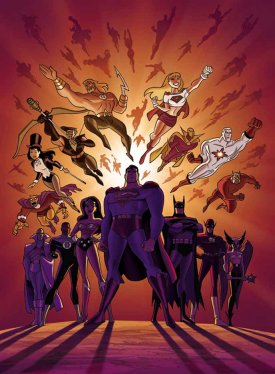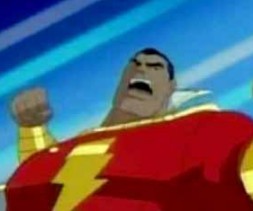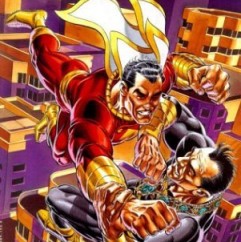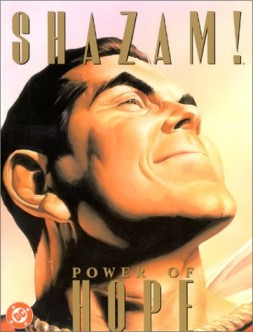|
Justice
League Unlimited
The Clash
Original Airdate - 06/11/05
After
last week's somewhat fluffy episode "Double
Date," JLU returns this week with a hard
hitting episode (literally) that highlights one of Derek's
favorite characters and features an unflattering cameo by
another. I like to call this episode "Derek's Double
Date."
Derek's
first boyfriend Metamorpho and Elongated Man are busy battling
Parasite one day when Batman shows up to join in the fun.
After draining Metamorpho and E-Man of their powers, the
situation escalates and Batman calls in for backup. Superman
has his hands full, so the newest member of the JLU and
Derek's other boyfriend Captain Marvel shows up to save
the day.
When
Superman finally plods in, he seems somewhat put off by
Marvel's rugged good looks and boyish charm. It's easy to
see why Derek has such a chubby for him.
Captain Marvel
makes some brief statements to the press about how happy
he is that Lex Luthor has been rehabilitated and wishes
him the best of luck on his bid for the Presidency. The
press wildly misquotes him and Captain (Captain of what?)
Marvel is eventually called before the JLU core members
for a lecture about being a team player.
Later,
Superman attends a charity event sponsored by Luthor to
unveil Lexor City, a futuristic city for the poor Luthor
has built. Still in a bad mood from earlier events and reports
of stolen kryptonite from S.T.A.R. Labs, Superman is skeptical
about Luthor's true motives. When he overhears Luthor and
his assistant talking about "timers" and "escapes routes"
the Man of Steel begins searching the city for an explosive
device.
He soon
finds something, but Luthor explains that it is just a new
kind of power reactor. Superman doesn't believe him and
Captain Marvel has to step in to protect Luthor. Soon, two
of the leagues most powerful members are slugging it out
while Luthor cheerfully looks on.
This is the
debut of Captain Marvel in the Bruce Timm DCU and it's a
favorable one. His character translates well to the screen
and nicely contrasts the more established team members.
It's a shame the episode ended the way it did because it
probably means we won't get to see that origin of Captain
Marvel. Somebody somewhere is wondering why he keeps saying
"SHAZAM!"
While
Superman and Captain Marvel coming to blows and destroying
a city is wildly out of character for the two "boy scouts"
of the DCU, it made for good action. If you can get over
that leap of logic, the overall story is enjoyable and again
the main plot of JLU moves ahead at a good pace.
Derek's
Continuity Corner
Why
does he keeps saying "SHAZAM?" Because technically,
that's the name we have to use when discussing this Captain
Marvel, as DC's crosstown rival Marvel Comics actually owns
the trademark, periodically using it for different characters
that have varying levels of suck, unless they're written
by Peter David.
Created
by C.C. Beck back in 1940, orphan newsboy Billy Batson was
beckoned into an abandoned subway station by a mysterious
stranger. (It was a simpler time.) Lured ever deeper, Billy
noticed the train and the tunnel itself looked like nothing
on this Earth. As he passed by statues of the Seven Deadly
Sins, Billy figured he was either on a magical journey or
in Donald Rumsfeld's country estate.
The
mysterious stranger disappeared, though in the 90's writer/artist
Jerry Ordway added in that the man was the ghost of Billy's
father, making this element a bit more palatable. At the
end of the tunnel sat an old man on a huge carved throne.
This was the ancient Egyptian wizard Shazam. For reasons
no one has adequately explained to this day, a boulder held
by a thread loomed over him.
Explaining
that he needed a champion of justice, the ancient wizard
commanded Billy Batson to speak his name, "SHAZAM!"
A bolt of lightning crackled, the thread broke, and Shazam
turned into dust. Luckily, Billy Batson also transformed
into Captain Marvel, strong-jawed and crinkle-eyed, designed
to look like movie actor Fred MacMurray before Disney got
ahold of him.
The
ghost of Shazam further explained his goals, including that
Billy was now powered by several ancient gods, each contributing
a letter to his magical anagram. Solomon, Hercules, Atlas,
Zeus, Achilles and Mercury channeled their powers into the
young boy.
Captain
Marvel took the country by storm, and with his "Marvel
Family" -- Mary Marvel and Captain Marvel, Jr. -- didn't
just rival Superman and Batman in sales. For a while, Captain
Marvel Adventures and Whiz Comics left the
other books in the dust. To halt the popularity, National
Periodical Publications (DC) sued Fawcett, the publishers
of Captain Marvel, for copyright infringement.
Though
Fawcett would have won the case, the publisher had decided
that comics weren't where they wanted their business to
go, so they settled and eventually sold the character rights
to the company that would become DC. The character lay fallow,
but he was remembered. A character talks about him in West
Side Story, and of course, Gomer Pyle punctuated conversations
with the word Shazam, which most people today think he originated.
It was actually just sitcom writers' way of letting you
know Pyle was a simpleton because he still read comic books.
In the
sixties, Marvel Comics launched their own Captain Marvel
because nobody else was using the name. Kree warrior Captain
Mar-Vell had been sent to Earth to lead an invasion, but
fell in love with our people and betrayed his own. Later,
writer Roy Thomas threw in that due to the power of the
Nega-bands, Mar-Vell and perpetual boy sidekick Rick Jones
could not co-exist; they had to switch places and thus became
a Marvel twist on the Billy Batson legend.
DC decided
to relaunch the original Captain Marvel in the early 70s,
but because Marvel Comics had been publishing a character
with that name (and trademark), a new name for the feature
had to be found. And so the unwieldy name "...with
one magic word....SHAZAM! The original Captain
Marvel" hit the stands in 1973. In one of those rare
moments of taking care of an original creator, DC even brought
C.C. Beck into the fold to illustrate. For two years or
so, the character's popularity surged, helped by a really,
really bad Saturday morning live-action show that TV Land
now shows every weekend.
Until Crisis
on Infinite Earths brought all their worlds together,
Captain Marvel existed on Earth-S, which partially explained
how he could still be somewhere between 12 and 15 after fighting
crime and Nazis in the 1940s. Every time "The Big Red
Cheese" (named so by his enemy Dr. Sivana, who understood
the power of cheese) and Superman met, they did, indeed, end
up fighting.
Their
best confrontation, one borrowed here, came in Mark Waid
and Alex Ross' brilliant Kingdom
Come. They figured out that Superman couldn't stand
up to the magic lightning too well, and had Billy repeatedly
call it down to beat the snot out of the Kryptonian.
After
all the worlds became one, Captain Marvel spent a short
amount of time in the Justice League, but, true to his appearance
here, chose to focus his energies on protecting his home,
Fawcett City. Though he is still allegedly twelve, Billy
Batson keeps getting portrayed as somewhat naive for dramatic
purposes; you'd think that eventually a guy with the wisdom
of Solomon would at least open his eyes to the world around
him.
DC has
been collecting the original comics into The Shazam Archives,
but for more modern twists, two works stand out. When Jerry
Ordway revamped Captain Marvel and really found an explanation
for his seeming to be a little out of step with modern times,
he did it in a graphic novel entitled The
Power of Shazam!, which fleshes out Billy's origin
and makes a great stand-alone adventure. It was spun off
into a critically acclaimed series. The other great Shazam
book was by Paul Dini and Alex Ross, done as part of their
six year project to find an excuse for Ross to paint DC's
flagship characters. Shazam!:
Power of Hope features beautiful paintings of the character in action,
with text by Dini that captures a lot of what people like
about Captain Marvel and Goodson just doesn't understand,
preferring to befoul it with his blunt-tipped rapier wit:
innocence.
features beautiful paintings of the character in action,
with text by Dini that captures a lot of what people like
about Captain Marvel and Goodson just doesn't understand,
preferring to befoul it with his blunt-tipped rapier wit:
innocence.
As for
Metamorpho, I just like him, okay?
|









